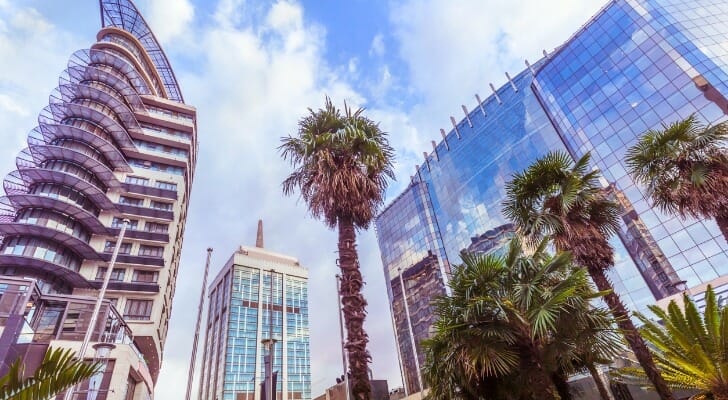With nearly a third of the world’s mineral resources, significant energy reserves, abundant arable land and the fastest growing population of any continent, Africa represents a special opportunity for investors seeking exposure to under-developed economies. However, unstable national governments and frequent military conflicts, among other variables, help to make Africa an especially risky place to invest. Many U.S. investors who put money into Africa use diversified exchange-traded funds (ETFs) and American Depositary Receipts (ADRs) to counter this risk. You can also have a financial advisor help you with your investments.
Why Invest in Africa?
Natural resources are the biggest strength of Africa, the second-largest continent on Earth. Africa’s reserves of oil, natural gas, gold, diamonds, copper, uranium, platinum, chromium and other minerals are all plentiful. There’s also an abundance of untapped agricultural land. Additionally, many opportunities for developing hydroelectric power also exist.
Population is where Africa really stands out. It has more than 1.2 billion people and it’s the fastest-growing continent, forecast to double in size to 2.4 billion by 2050. As it stands today, the African population is also very youthful, with an estimated 41% under age 15, according to the U.N.
Africa’s population growth means its labor force and consumer market should expand in the future. Elsewhere in the globe, population growth is generally much slower.
Investing in Africa With Individual Stocks

The national economies of African countries are mostly under-developed compared to Europe and North America. However, the continent hosts many large and well-established public companies. As of the time of this writing, the three biggest African public companies by market capitalization (all based in South Africa) include:
- Naspers (NPN): $104 billion market cap
- Anglo American (AAL): $53 billion market cap
- Anglo American Platinum (AMS): $39 billion market cap
There are 18 different national and regional stock exchanges that can accommodate traders investing in African securities. The largest is South Africa’s Johannesburg Stock Exchange, which is more than a century old and has a total market capitalization of more than $1 trillion. The second-largest bourse on the continent is the Nigerian Stock Exchange. The Egyptian Exchange is the third-largest, while the fourth-largest is the Casablanca Stock Exchange in Morocco.
Investing in Africa With ETFs
With more than 54 countries and a multitude of exchanges, each with different rules, trading in individual African stocks is a complicated endeavor for foreign investors. For that reason, Africa-focused ETFs are the simplest way for investors to participate in the continent’s markets.
ETFs are funds that hold broad baskets of stocks. ETF shares trade on U.S. exchanges like regular stocks, so they’re liquid and easy to invest in. They also provide built-in diversification to help moderate the risk of investing in developing economies like Africa’s.
As of the time of this writing, the largest African ETFs are:
- iShares MSCI South Africa ETF: invests in large and mid-sized South African firms
- VanEck Africa Index ETF (AFK): tracks the MVIS GDP Africa Index
- Global X MSCI Nigeria ETF (NGE): invests in large Nigerian companies
Investing in Africa With ADRs
Another very accessible way for U.S. investors to trade shares of African companies is through American Depositary Receipts, or ADRs. These bank- and brokerage-issued certificates each represent one share of a specific foreign-based company. They even trade on U.S. exchanges.
As of the time of this writing, the largest African ADRs by market capitalization include:
- Naspers ADR (NSPNY): $68 billion market cap
- Anglo American Platinum ADR (ANGPY): $23 billion market cap
- FirstRand ADR (FANDY): $17 billion market cap
Risks of Investing in Africa
Investing in Africa also carries some unique risks. Among these are the dangers of war and government instability that lead to regime change. War and regime turnover can both wreak havoc on economies and investments alike. Military campaigns cause death and damage infrastructure, and new governments often nationalize commercial industries.
The instability in African states contributes to notable volatility in the performance of investments in its public companies. This makes it difficult to predict the return on investments over both the short and long term.
The MVIS GDP Africa Index, which tracks a broad basket of shares of Africa-based and Africa-focused companies, rose approximately 21% during the year ending in September 2021. However, since the index’s inception in 2007, it has fallen almost 15% collectively.
Bottom Line

Africa’s largely untapped natural resource riches and rapidly expanding population make it unique among the world’s continents. The nations that govern the landmass vary widely in size, economic development and stability. The frequency of wars and regime changes contribute to significant uncertainty, resulting in large swings in the performance of African investments. Investors can get exposure to African opportunities through ETFs and ADRs, which are potentially safer and less volatile routes than direct investments.
Tips on Investing
- Investing in Africa calls for careful attention to risk tolerance, as well as familiarity with international and emerging economies and currency fluctuations. Under such circumstances, a financial advisor’s insights can be helpful. Finding a qualified financial advisor doesn’t have to be hard. SmartAsset’s free tool matches you with up to three financial advisors in your area, and you can interview your advisor matches at no cost to decide which one is right for you. If you’re ready to find an advisor who can help you achieve your financial goals, get started now.
- You can forecast how much your non-U.S. securities may increase in value by using SmartAsset’s investment calculator. This can help you plan ahead so you can manage your portfolio accordingly.
Photo credit: ©iStock.com/THEGIFT777, ©iStock.com/peeterv, ©iStock.com/Credit:Sunshine Seeds
